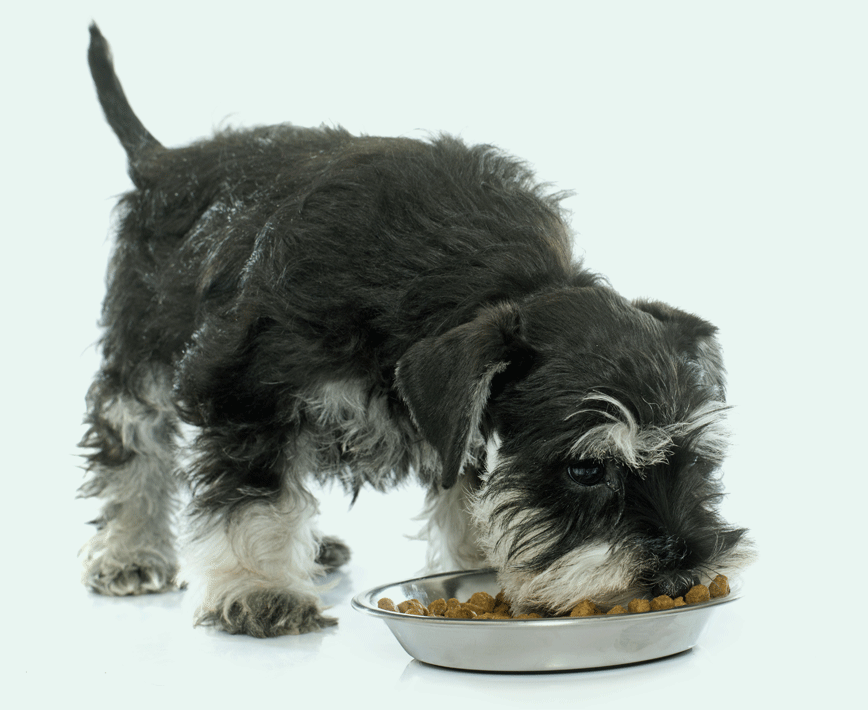Puppy guide
Your complete puppy guide
Find out more about caring for your puppy
Everything you need to know to help you get started
Bringing a puppy home is an exciting time for any household (who doesn’t want to hear the pitter-patter of tiny paws?), but it’s important to make sure you’re fully prepared and informed on what to expect when they walk through your front door for the first time. Download our puppy guide to find how to give your puppy the best care.
Frequently asked questions about puppy insurance
Want to find out more about our puppy insurance?
Got a question about our cover for your puppy? Or want to know more about puppies in general? We’ve answered a few questions for you here!
- Puppy insurance
- Cover
- Travel
- Is puppy insurance worth it?
There are few greater joys in life than welcoming a new puppy into your home and starting their journey from young pup into family dog. However, looking after a new puppy can be a challenge within itself as they require a lot of care and attention.
So, is puppy insurance worth it?
Having insurance for your puppy means that you can be protected against unexpected vet fees and other costs that can come with owning a young dog. Puppies can be curious souls, and nobody wants their young pup to hurt themselves while they're exploring. With our puppy insurance, you can choose between our Accident Only cover and cover against Accident and Illness to help pay for up to £12,000 of your annual vet fees.
Our cover starts for puppies over eight weeks of age. We cannot cover claims arising within the first 14 days of your insurance starting and pre-existing illnesses and conditions are not covered.
The excess for vet fee claims for dogs under eight years of age is the first £150 of the cost of treatment.
- What age can I insure a puppy?
You can get insurance for your puppy from eight weeks of age. If you’ve recently welcomed a young pup into your home, then you can choose from either our Accident Only cover or cover for Accident and Illness to help cover you from the cost of up to £12,000 in annual vet fees.
We cannot cover claims arising within the first 14 days of your insurance starting and pre-existing illnesses and conditions are not covered.
- Can I get insurance for more than one puppy?
If you’re welcoming more than one puppy into your home, or whether you’ve got a litter of puppies to look after then you may want to consider multi-pet insurance. Instead of having each of your dogs on different pet policies, with our multi-pet insurance, you can save both hassle and money by putting your puppies onto one policy!
Multi-pet insurance for your pups not only means that you don’t have to deal with different policies for each of your dogs, but you’ll even get a discount when you insure your puppies with us! We allow up to five pets, cats and dogs, on one policy.
Our multi-pet discount includes 10% off each pet that you insure with us. Each pet on your policy will need to be on the same level of cover.
Cover starts for puppies over eight weeks of age. We do not insure dogs that are used for breeding purposes and pre-existing illnesses and conditions are not covered.
- How does multiple cat and dog insurance work?
If you’ve got dogs and cats at home, then why not look at multi-pet insurance?
Instead of having each of your dogs and cats on different pet policies, with our multi-pet insurance you can save any hassle and take advantage of our multi-pet discount. You can cover up to five pets on one policy. We are unable to insure dogs and cats that are used for breeding purposes and pre-existing illnesses and conditions are not covered.
- Dog insurance with Public Liability
Public Liability insurance for your dog, sometimes referred to as Third Party Liability insurance, can provide up to £2million per event if your dog injures someone or damages property and you are held liable.
If you're out for a walk with your dog and they were to knock somebody over, then we can keep you covered if you've chosen our Public Liability option. Heading out for a dog walk shouldn't end in hefty compensation costs, which is why we offer dog owners Public Liability protection for claims of property damage or injury from a third party.
Cover only applies in the UK.
Some dog breeds cannot be covered by our Third Party Liability option, see “Are there any breeds of dog that you are unable to insure?” For assistance dogs to qualify for Third Party Liability cover, they must have been trained by a member of, and within the guidance of, the organisation of Assistance Dogs UK.
- How does dog insurance work for vet fees?
Having insurance for your dog means that you can be covered against the cost of potentially very expensive trips to the vet.
You get to choose either Accident Only cover or cover for Accident and Illness for your dog. We offer three levels of vet fee cover, which means that you can be covered for up to £3,000, £6,000 or £12,000 per year.
If your claim has been successful, then we can pay the agreed amount, less any excess, either:
- Straight into your bank account so you aren't left out of pocket, or;
- To your vet if this is more convenient for you and your vet.
All vet fee claims are handled in the UK by Covea Insurance. While your claim is being dealt with, you can receive regular updates on its progress via email or text message.
- Can I get dog insurance which includes cover just for accidents?
Yes! Our Accident Only cover still offers you the same great choice of annual vet fee cover options for £3,000, £6,000 or £12,000.
Dogs can suffer injuries when you least expect it. Whether they’ve hurt themselves while out for a walk, or if playtime has ended in a trip to the vets.
Our Accident Only policy provides you with an uncomplicated level of cover for your dog which aims to protect you against potentially expensive trips to the vet to treat your dog for an injury.
Vet fees arising from illnesses that your dog may be suffering from are not covered and the excess you will be required to pay for treatment for injury depends on the age of your pet. Unfortunately, we can’t cover any pre-existing conditions; nor claims for injury within the first 48 hours of your cover starting.
- Can I get dog insurance for a mixed breed dog?
Yes! Our dog insurance includes mixed breed dogs, as well as pedigree and cross breed dogs. If you’ve got a mixed breed pooch, then we can include them on your policy.
Unfortunately, we cannot cover (whether pedigree, cross breed or mixed breed) any of the following: Dogo Argentino, Fila Brazillero, Japanese Tosa, Pit Bull, Shar-Pei, Wolf or Wolf Hybrid dog and any animal registered under the Dangerous Dogs Act 1991 and/or the Dogs (Muzzling) regulations (Northern Ireland) 1991 or any amendments.
There are additional breeds that we cannot cover for our optional Third Party Liability cover, see "Are there any breeds of dog that you are unable to insure?"
- Do you cover BOAS in dog breeds such as French Bulldogs and Pugs?
BOAS (Brachycephalic Obstructive Airway Syndrome) is a condition which is a progressive disorder that can impair the ability of certain breeds of short nose dog to exercise, play, eat and sleep.
We are able to consider claims provided that there are no pre-existing signs, symptoms or advice provided by a vet. In practice this usually means that the dog has to be insured with us from a very young age.
- Are there any breeds of dog that you are unable to insure?
Unfortunately, for all of our policies, we cannot provide any vet fees or liability cover for any animal registered under the Dangerous Dogs Act 1991 and/or the Dogs (Muzzling) regulations (Northern Ireland) 1991 or any amendments; or (whether pedigree, cross breed, mixed breed or known or classed as the names listed) an Abruzzese Mastiff, African Crested Dog, African Wild Dog, Alangu Mastiff, American Bulldog, American Bully, American Bully XL, American Indian Dog, American Mancon, American Mastiff, American Pit Bull Terrier, American Rottweiler, American Staffordshire Bull Terrier, American Staffordshire Terrier, Argentine Dogo, Argentinian Mastiff, Australian Dingo, Bandogge, Bandogge Mastiff, Blue Bull Terrier, Boerboel, Bole, Brazilian Mastiff, Bully, Bully Kutta, Canadian Inuit Dog, Canary Dog, Canary Mastiff, Cane Corso, Cão de Fila de São Miguel, Cão Fila, Chinese Shar Pei, Czechoslovakian Wolfdog, Dingo, Dogo Argentino, Dogue Brasileiro, East Siberian Laika, Fila Brasileiro, Gull Dong, Husky Wolf Hybrid, Inuit Dog American, Irish Staffordshire, Irish Staffordshire Blue Bull Terrier, Irish Staffordshire Bull Terrier, Irish Wolfhound, Italian Mastiff, Japanese Mastiff, Japanese Tosa, Johnson American Bulldog, Korean Jindo, Korean Mastiff, Laika, Libyan Desert Dog, Neapolitan Mastiff, Northern Inuit Dog, Pakistani Bull Dog, Perro de Presa Canario, Pit Bull Mastiff, Pit Bull Terrier, Pocket Bully, Presa Canario, Racing Greyhound, Sarloos Wolfhound, Shar Pei, South African Boerboel, South African Mastiff, Tamaskan Dog, Tibetan Mastiff, Tosa, Tosa Inu, Utonagan Dog, Wolf Hybrid and Wolfdog.
- How long can I claim for each condition?
Provided that you have chosen our Accident and Illness cover we will refresh your veterinary fees benefit each year allowing you to claim for ongoing conditions on your pet insurance for as long as we are able to offer a renewal and you renew without a gap in cover.
- Is dental treatment covered?
Yes. Depending on the type of cover you select we are able to cover treatment provided that it is related to an injury or illness.
- Do you insure pets used for breeding?
No, we cannot provide cover for pets that are used for breeding. There are special policies for their specific risks, and we suggest you speak to your vet or local insurance broker for help finding suitable cover.
- Do you provide cover for chronic and ongoing veterinary conditions?
We offer a choice of three annual benefit levels. You can insure up to the chosen limit each year and provided that we are able to offer renewal and you renew without a gap in cover the benefit will be reinstated for the next period of insurance. This means that you can claim for chronic or ongoing conditions such as arthritis, diabetes, heart or skin conditions whilst the policy remains in force.
- Do you only cover UK residents?
Yes. You must be a UK resident and domiciled in the UK.
- Is there an excess on this policy?
Yes there is an excess you will need to pay in respect of each illness or injury for which you wish to claim each year. These are as follows:
Veterinary Fees
For each illness or injury arising during each period of insurance your excess will be:
- For pets under eight years of age at time of treatment: The first £150.
- For pets older than eight years of age at time of treatment: The first £150 plus 20% of the remaining cost of treatment.
Holiday Cancellation - The first £75 of the claim
Accidental Damage to Third Party Property - The first £75 of the claim
Accidental Damage to Pet Accessories - The first £50 of the claim
Emergency Expenses - The first £50 of the claim
Third Party Liability - The first £250 of property damage claim
- What information do you need to start my cover?
We need some details about you and the pet you wish to insure together with either bank account or debit/credit card details for payment of the premium.
- How do you calculate premiums?
We look at a number of factors including the age and breed of the pet, the risk of chronic or recurring conditions associated with certain breeds, the area the pet lives in and any claims history.
- How can I pay for my policy?
You can choose to pay in full by credit or debit card. Alternatively, you can take advantage of our interest free monthly payment option and simply spread the payments out, without any additional cost.
- Can you pay my vet directly?
This is something we are able to do provided that your vet is happy with this arrangement.
- How do I make a claim?
If you need to make a claim then feel free to contact our UK-based claims team. Once you've made a claim, we can keep you updated regularly by text or email.
Make your claim by either calling Covea Insurance on: 0333 130 4534 or email: claims@petadminteam.com
- Setting up a policy
As the insurance policy is a legal agreement between us and the policyholder, we can only set up a policy with the person who will be named as the policyholder.
- Can I travel with my cat or dog on a plane?
Most airlines will allow you to take a cat or dog on the plane, either in the cabin or down below in cargo. Before booking your flight, check with the airline that they can in fact, fly your pet. You may have to book in advance, with some airlines charging additional fees for traveling pets.
Your pet will need pet travel documents before they can fly, as this will need to be presented to the airline when checking in your pet. Depending on where your pet is flying from and where they are flying to, they will need to have certain vaccinations and treatments for illnesses such as rabies or tapeworm. You will most likely need to proof of the vaccinations and treatment from your vet.
- How should I prepare my cat or dog for traveling abroad?
If you're traveling abroad, or simply going away for a few days in the UK, it’s still a good idea to prep your pet for the journey. Such preparation measures could help reduce the stress levels in your pet, help you understand how best your pet travels, and help make the journey that little bit easier for both you and your pet.
- Before taking your pet on any long car journey, take them on short drives close to home, while slowly increasing the amount of time spent in the car. This will not only help them get used to being confined in a car, but it could help them overcome travel sickness if they suffer from it.
- Avoid feeding your cat or dog right before traveling, as the motion of the car, train or plane could upset their stomach. Make sure they have plenty of water, so they are well hydrated.
- Before any long journey, consider the health of your pet. Are they fit and healthy enough to travel? Make sure they are up to date with their vaccinations and treatments and be sure to check if they need any additional ones, as this could be a requirement of certain countries or airlines.
- To help ensure your pet is comfortable while traveling, make sure they have plenty of water, (food but depending how well they travel on a full stomach), toys to keep them occupied, and a comfortable place to sleep and rest. Most importantly, they need to be secured while traveling, whether it be in a crate that is large enough for them to sit in, stand and move around in, or strapped in using a proper pet seat belt for the car.
- What are the other alternatives to taking your pet on holiday?
If you don't want to take your cat or dog on holiday with you, then why not consider the following instead:
- Leave your pet with a friend or family member
- Have a qualified pet-sitter come around to your home, to feed, walk and check-up on your pet
- Take your pet to a reputable kennel or cattery
Your policy document explorer
Your policy documents
The documents below apply to all pet insurance policies purchased from 1st May 2024 onwards.
Existing customers: If you purchased your policy before the date shown above, you can log into your account where you can view, amend, and renew your documents here. If you have not already signed up for an account, then you can register here.
For all policies with renewal dates after 13th May 2024, please find your policy documents below:








